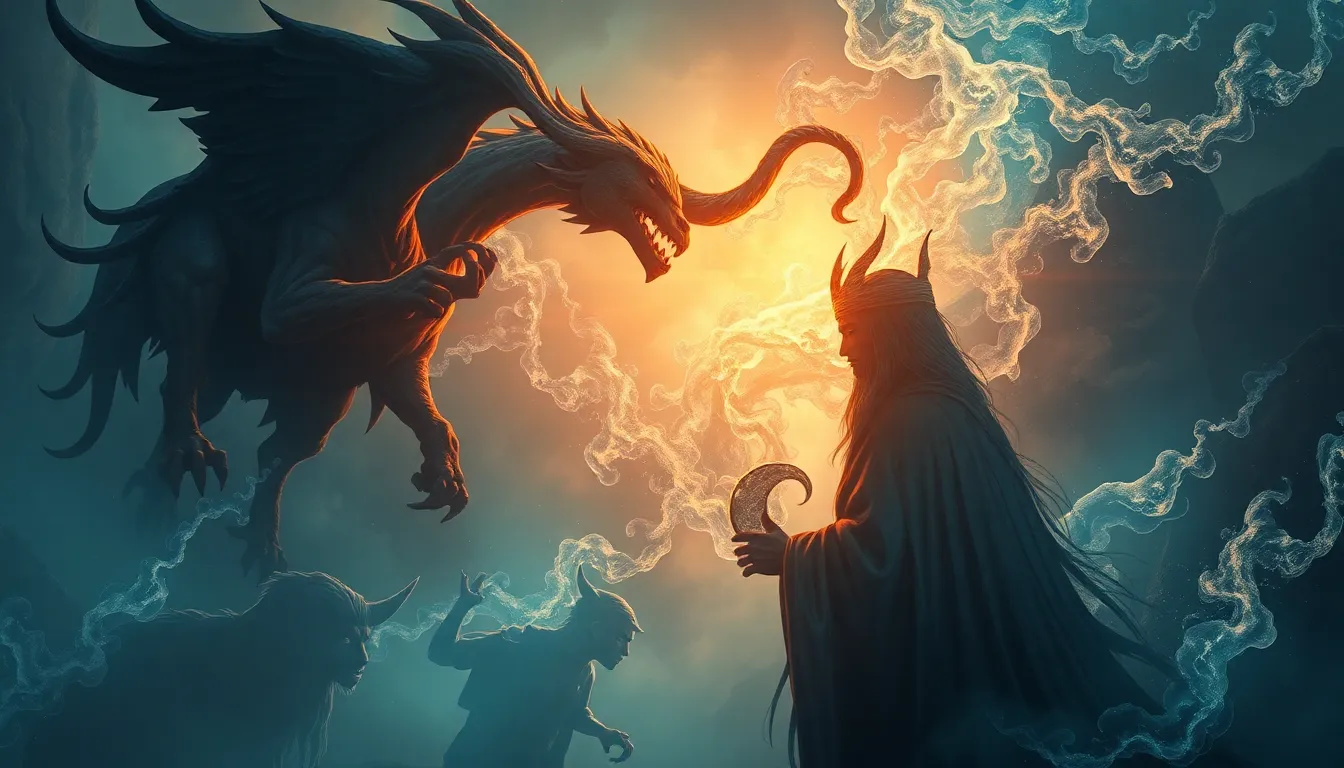Moral Myths and the Nature of Identity: Lessons from Legends
I. Introduction
Moral myths are powerful narratives that shape the ethical frameworks within which individuals and societies operate. These myths, often rooted in ancient traditions, hold significant cultural weight and influence our understanding of right and wrong. They contribute to the formation of societal norms and values, providing individuals with a moral compass.
Identity, on the other hand, is a complex and multifaceted concept that encompasses personal beliefs, cultural backgrounds, and social roles. The interplay between moral myths and identity is profound, as these narratives often define the very essence of who we are. This article explores how myths shape our moral understanding and influence our identities, reflecting on their relevance in contemporary society.
II. Understanding Moral Myths
A. Definition and characteristics of moral myths
Moral myths can be defined as stories or narratives that convey moral lessons and ethical principles, often embedded in cultural traditions. They typically possess certain characteristics:
- Timelessness: Many moral myths have been passed down through generations.
- Symbolism: They often use symbols to convey deeper meanings.
- Universality: While culturally specific, the themes resonate across different societies.
B. The role of moral myths in societal norms and values
Moral myths play a crucial role in shaping the norms and values of a society. They provide a shared understanding of ethics, guiding individuals in their actions and decisions. By reinforcing collective beliefs, these myths contribute to social cohesion and identity.
C. Examples of prominent moral myths across different cultures
Throughout history, numerous moral myths have emerged in various cultures. Some notable examples include:
- The story of Prometheus in Greek mythology, symbolizing the quest for knowledge and the consequences of defiance.
- The tale of the Buddha, emphasizing compassion and the pursuit of enlightenment.
- The Native American legend of the Great Spirit, teaching respect for nature and interconnectedness.
III. The Intersection of Myths and Personal Identity
A. How moral myths influence individual self-conception
Moral myths significantly influence how individuals perceive themselves. The narratives we internalize shape our values, beliefs, and behaviors, thus impacting our self-conception. For instance, someone who identifies with the heroism in a myth may view themselves as a courageous person.
B. The psychological impact of myths on identity formation
The psychological underpinnings of identity formation are deeply intertwined with the myths we embrace. These narratives often serve as templates for behavior, influencing not only personal choices but also how we relate to others and our environment.
C. Case studies: individuals shaped by cultural myths
Numerous individuals have reported being profoundly influenced by cultural myths. For example:
- A young woman who embodies the values of independence and resilience from the myth of Athena.
- An immigrant who draws strength from the narrative of the American Dream, shaping their aspirations and identity.
IV. Legends as Frameworks for Moral Lessons
A. Overview of legendary narratives and their functions
Legends serve as frameworks that convey moral lessons and ethical standards. They often feature larger-than-life characters facing moral dilemmas, providing audiences with insights into human nature and ethical behavior.
B. Analysis of key legends and the moral lessons they impart
Consider some key legends:
- The Arthurian legends, which emphasize the ideals of chivalry and honor.
- The story of Robin Hood, reinforcing values of justice and fairness.
- The fables of Aesop, which succinctly convey morals about human behavior.
C. The role of storytelling in moral education
Storytelling is a vital tool for moral education. Through narratives, complex ethical situations can be explored, allowing individuals to reflect on their values and decisions. This method of teaching is effective because it engages emotions and imagination, making moral lessons more relatable.
V. The Evolution of Moral Myths Over Time
A. Historical context of moral myths and their adaptation
Moral myths have evolved over time, adapting to the changing values and beliefs of societies. Historical events, cultural shifts, and technological advancements have all influenced how these myths are interpreted and transmitted.
B. The impact of globalization on the evolution of these myths
Globalization has led to the cross-pollination of moral myths, with different cultures sharing and adapting narratives. This blending can create new moral understandings but can also lead to conflicts when differing values collide.
C. Modern reinterpretations of ancient legends
Modern reinterpretations of ancient legends often reflect contemporary values. For instance, retellings of classic myths may emphasize themes of gender equality or environmentalism, demonstrating the adaptability and relevance of moral myths in today’s society.
VI. The Role of Religion in Shaping Moral Myths
A. Examination of religious texts as sources of moral myths
Religious texts are rich sources of moral myths, providing narratives that convey ethical principles. From the parables in the Bible to the teachings of the Quran, these texts offer insights into morality and human behavior.
B. Comparative analysis of moral lessons from different religions
While different religions may offer distinct narratives, many share common moral lessons:
- The importance of compassion and kindness.
- The value of honesty and integrity.
- The pursuit of justice and equity.
C. The influence of religious narratives on personal identity
Religious narratives often play a central role in shaping personal identity. Individuals may find purpose and meaning in their faith, using these stories as a guide for moral behavior and self-understanding.
VII. Moral Myths in Contemporary Society
A. The relevance of moral myths in today’s ethical dilemmas
In contemporary society, moral myths continue to be relevant as we navigate complex ethical dilemmas. Issues such as climate change, social justice, and technological advancements require a moral framework that can be informed by these narratives.
B. How modern media perpetuates or challenges traditional myths
Modern media plays a dual role in the realm of moral myths. On one hand, it perpetuates traditional narratives; on the other, it challenges and reinterprets them. Films, literature, and social media can either reinforce existing myths or encourage critical thinking about them.
C. The role of social movements in reshaping moral narratives
Social movements have the power to reshape moral narratives by highlighting previously marginalized voices. Movements advocating for equality, justice, and environmental sustainability bring new myths to the forefront, challenging outdated moral understandings.
VIII. Identity Conflict and Moral Myths
A. How conflicting moral myths can lead to identity crises
Conflicting moral myths can create identity crises as individuals grapple with competing narratives. When personal beliefs clash with societal norms, it can lead to confusion and distress, prompting a reevaluation of one’s identity.
B. The impact of cultural hybridity on individual identity
Cultural hybridity, where multiple cultural influences converge, can enrich identity but also complicate it. Individuals may find themselves navigating multiple moral frameworks, leading to a complex interplay between different narratives.
C. Case examples of identity conflict arising from moral contradictions
Examples of identity conflict can be seen in:
- An individual from a traditional background who embraces modern values, causing tension with family.
- A member of a minority group reconciling their cultural identity with mainstream societal expectations.
IX. Lessons Learned: Bridging Myths and Identity
A. Strategies for integrating moral lessons from myths into personal identity
Integrating moral lessons from myths into personal identity requires reflection and openness. Individuals can:
- Engage with various myths to understand different perspectives.
- Reflect on personal values and how they align with or diverge from cultural narratives.
- Seek dialogues with others to explore the implications of these myths on identity.
B. The importance of critical thinking in engaging with moral myths
Critical thinking is essential when engaging with moral myths. This involves questioning the validity of narratives, assessing their relevance



